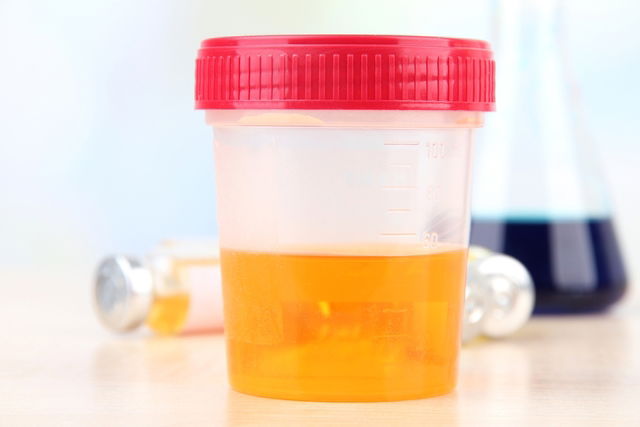Urobilinogen in the urine is the result of bilirubin breakdown in the intestines, which can be caused by liver disease, blood cell abnormalities and biliary disease. This bilirubin is then absorbed into the blood and excreted through the urine. When bilirubin production increases, the concentration of urobilinogen in the gut will also increase, resulting in higher levels in the urine.
The normal level of urobilinogen in the urine is under 1.0 mg/dL. Levels that are above 1.0 mg/dL may be a sign of liver problems, hemolytic anemia or biliary obstruction.
You should follow-up with your doctor if you have high levels of urobilinogen in your urine, as a more thorough assessment is required to identify a cause and initiate treatment as necessary.

Common causes
Urobilinogen is naturally found in the urine in scant amounts. Levels that are under 1 ml/dL are not of clinical concern. Nonetheless, higher levels when combined with other urine and bloodwork abnormalities may be a sign of:
1. Liver disease
Some liver diseases, like cirrhosis, hepatitis, or liver cancer, can increase the amount of bilirubin, leading to high levels of urobilinogen in the urine. The presence of this breakdown product can occur with liver problems, even before more obvious symptoms start to emerge.
Therefore, if high levels of urobilinogen are noted in the urine, the doctor should also order other blood tests, like a complete blood count and liver enzyme tests. Read more about symptoms of liver disease that you should report to your doctor.
2. Blood cell abnormalities
Some conditions cause the body to produce antibodies that attack red blood cells, resulting in their destruction. As a result, bilirubin levels will increase in the blood, which can be detected in a blood test or with high levels of urobilinogen in the urine.
Hemolytic anemia is also associated with increased bilirubin levels, as well as splenomegaly. The spleen helps to filter the blood and removes old red blood cells, and also produces and stores white blood cells. Inflamed spleens do not function appropriately, which can caused increased bilirubin. Learn more about what causes an enlarged spleen (or splenomegaly) and how it can be treated.
3. Biliary disease
Some conditions, like cholestasis (bile duct obstruction) or cholangitis (inflammation of the bile ducts) can lead to increased urobilinogen in the urine. These can also cause increased bilirubin and liver enzyme levels in the blood.
Treatment options
If urobilinogen levels in the urine are above 1 mg/dL, it is important to follow-up with your doctor to identify a cause for the increase. Once determined, the doctor is then able to proceed with treatment.
High urobilinogen levels that are caused by hemolytic anemia can be treated with medications that regulate the immune system, like corticosteroids or immunosuppressants. Problems related to the liver can often be addressed with rest and diet changes.
High levels caused by liver cancer may require surgical removal of the affected parts of the liver, followed by chemotherapy and/or radiation therapy.
